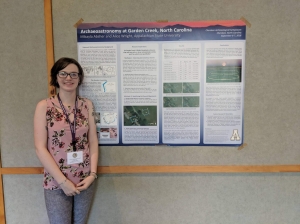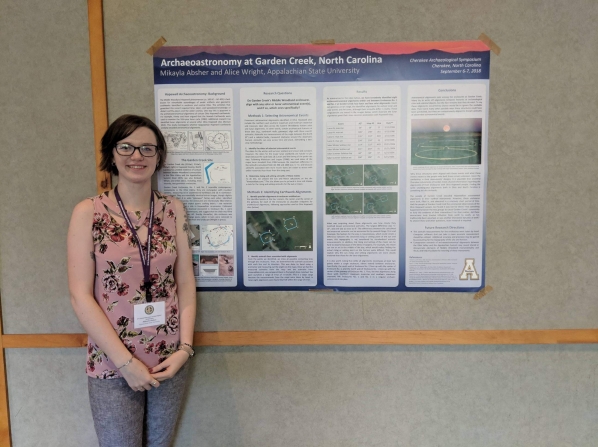Mikayla Absher, an anthropology major, recently presented at the 8th Annual Cherokee Archaeology Symposium in Cherokee, hosted by the EBCI Tribal Historic Preservation Office. The two day event featured presentations by archaeologists, both professional and academic, from across the Southeastern United States. Mikayla is a senior concentrator in archaeology and hopes to pursue a PhD program next year.
Her poster, "Archaeoastronomy at Garden Creek: Testing for Solar and Lunar Alignments of the Middle Woodland Earthworks," was co-authored by Dr. Alice Wright, also of the Department of Anthropology, and was developed out of an independent study. Between the 1960s and the 2010s, archaeological fieldwork at the Garden Creek site (31Hw2, 31Hw8) in Haywood County, North Carolina revealed monumental earthworks dating to the Middle Woodland period (ca. 300 BC -- AD 600). Artifacts recovered from Mound No. 2 and Enclosure No. 1 have been interpreted as evidence for ceremonial exchanges between communities in the Appalachian Summit and in the Ohio River Valley as part of the wider Hopewell Interaction Sphere. Ongoing assessment of the architecture of Enclosures No. 1 and 2 provided additional support for this interpretation. In this poster, they presented evidence for possible solar and lunar alignments associated with Garden Creek’s enclosures, and discussed how these alignments compare to well-known archaeoastronomical patterns observed at Scioto Hopewell sites in Ohio.
About the Department of Anthropology
The Department of Anthropology offers a comparative and holistic approach to the study of the human experience. The anthropological perspective provides a broad understanding of the origins as well as the meaning of physical and cultural diversity in the world – past, present and future. With nearly 200 undergraduate majors, the department offers numerous research opportunities for students including field schools, internships, lab projects and independent studies at home and abroad. Students may earn B.A. and B.S. degrees with concentrations in sociocultural anthropology, archaeology, biological anthropology, and social practice and sustainability.
About the College of Arts and Sciences
The College of Arts and Sciences is home to 16 academic departments, two stand-alone academic programs, two centers and one residential college. These units span the humanities and the social, mathematical and natural sciences. The College of Arts and Sciences aims to develop a distinctive identity built upon our university's strengths, traditions and unique location. Our values lie not only in service to the university and local community, but through inspiring, training, educating and sustaining the development of our students as global citizens. There are approximately 5,850 student majors in the college. As the college is also largely responsible for implementing Appalachian's general education curriculum, it is heavily involved in the education of all students at the university, including those pursuing majors in other colleges. Learn more at http://cas.appstate.edu
About Appalachian State University
Appalachian State University, in North Carolina’s Blue Ridge Mountains, prepares students to lead purposeful lives as global citizens who understand and engage their responsibilities in creating a sustainable future for all. The transformational Appalachian experience promotes a spirit of inclusion that brings people together in inspiring ways to acquire and create knowledge, to grow holistically, to act with passion and determination, and embrace diversity and difference. As one of 17 campuses in the University of North Carolina system, Appalachian enrolls about 19,000 students, has a low student-to-faculty ratio and offers more than 150 undergraduate and graduate majors.

